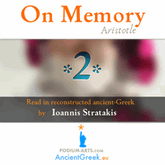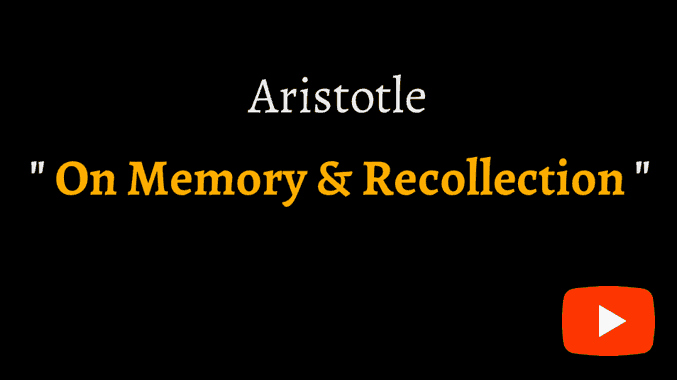• On Memory & Recollection •
• Aristotle •

Duration: 25 mins
Unabridged
Recorded: 2020
Price : $20
About “On Memory & Recollection" by Aristotle
In his work “On Memory and Recollection” (a.k.a. De Memoria) Aristotle examines memory (μνήμη) and recollection (ἀνάμνησις) as two related but separate things, which connect the soul (ψυχή) to the past, of itself and the world’s. Future and present, on the other hand, are given access to by means of expectation (ἐλπίς) and perception / sense (αἴσθησις). He defines memory as having the perception or knowledge of physical or mental objects without actually pursuing or experiencing them actively in the “now”. This implies that objects of memory can only be things experienced or learned in time past. Perception of memory must be connected with a “common sense”, the same one through which people perceive time.
Recollection is been examined in more detail, as the process humans use to search for stored information. Not only for the sake of remembering, but understanding, thinking, imagining etc. as well. Thus, where memory regards retaining any kind of information or perceptions and feelings, recollection is the process of recalling it.
You can follow the text of “on Memory & Recollection”, book 2 of “Parva Naturalia” by Aristotle, online at Archive.org
A very interesting and inclusive article on this work, by Sophie Grace Chappell, you can read at Academia.edu
about Aristotle
Aristotle (Gr.: Ἀριστοτέλης), one of the most important philosophers of Antiquity, was born in 385 BCE in Stageira of Chalkidike. Born in a rich family he had the opportunity to get high education. From 367 BCE on and for about twenty years, he studied philosophy in Athens by Plato and also taught in his Academy. After the death of Plato he moved to the city of Assus in Asia Minor, where he taught philosophy until 345 BCE., when he accepted an invitation by Theophrastus to teach in Mytilene. In 342 BCE King Philippus asked him to teach his 13 years old son, Alexander. After the death of Philippus Aristotle returned to Athens and established the “Lyceum”, where he set his teaching forth. However, after the death of Alexander in 323 BCE and having been accused by opponents for disrespect, he retired in Chalkis. He died in 322 BC from some stomach disease.
Aristotle left a lot of works. The works that have survived are distinguished in logical, physical, biological, psychological, metaphysical, moral, political, technological and various problems.
The Aristotelian works have included the following, which are not considered genuine: Physiognomy, About Miraculous Things Heard, About Colors, Mechanics, Rhetoric to Alexander and On Hearing.
About the audiobook
 The recording contains the complete, unabridged Ancient Greek text of “On Memory & Recollection”, book 2 of Parva Naturalia by Aristotle.
After purchase you will be able to download the zip file, containing the work in mp3 format.
The recording contains the complete, unabridged Ancient Greek text of “On Memory & Recollection”, book 2 of Parva Naturalia by Aristotle.
After purchase you will be able to download the zip file, containing the work in mp3 format.
You can listen to the first two paragraphs of "On Memory", an audio sample of the present audiobook. Please, click on the play-button bellow and, if you wish, follow the Ancient Greek text lower on the page, or alternatively watch the video, which is provided with a quick translation in English. Thank you!
ΠΕΡΙ ΜΝΗΜΗΣ & ΑΝΑΜΝΗΣΕΩΣ
Περὶ μνήμης καὶ τοῦ μνημονεύειν λεκτέον, τί ἐστι, καὶ διὰ τίν᾿ αἰτίαν γίγνεται, καὶ τίνι τῶν τῆς ψυχῆς μορίων συμβαίνει τοῦτο τὸ πάθος, καὶ τὸ ἀναμιμνήσκεσθαι· οὐ γὰρ οἱ αὐτοί εἰσι μνημονικοὶ καὶ ἀναμνηστικοί, ἀλλ᾿ ὡς ἐπὶ τὸ πολὺ μνημονικώτεροι μὲν οἱ βραδεῖς, ἀναμνηστικώτεροι δὲ οἱ ταχεῖς καὶ εὐμαθεῖς.
πρῶτον μὲν οὖν σκεπτέον ποῖά ἐστι τὰ μνημονευτά· πολλάκις γὰρ ἐξαπατᾷ τοῦτο. οὔτε γὰρ τὸ μέλλον ἐνδέχεται μνημονεύειν, ἀλλ᾿ ἔστι δοξαστὸν καὶ ἐλπιστόν (εἴη δ᾿ ἂν καὶ ἐπιστήμη τις ἐλπιστική, καθάπερ τινές φασι τὴν μαντικήν), οὔτε τοῦ παρόντος, ἀλλ᾿ αἴσθησις· ταύτῃ γὰρ οὔτε τὸ μέλλον οὔτε τὸ γενόμενον γνωρίζομεν, ἀλλὰ τὸ παρὸν μόνον. ἡ δὲ μνήμη τοῦ γενομένου· τὸ δὲ παρὸν ὅτε πάρεστιν, οἷον τοδὶ τὸ λευκὸν ὅτε ὁρᾷ, οὐδεὶς ἂν φαίη μνημονεύειν, οὐδὲ τὸ θεωρούμενον, θεωρῶν καὶ ἐννοῶν· ἀλλὰ τὸ μὲν αἰσθάνεσθαί φησιν, τὸ δ᾿ ἐπίστασθαι μόνον· ὅταν δ᾿ ἄνευ τῶν ἔργων σχῇ τὴν ἐπιστήμην καὶ τὴν αἴσθησιν, οὕτω μέμνηται [τὰς τοῦ τριγώνου ὅτι δύο ὀρθαῖς ἴσαι], τὸ μὲν ὅτι ἔμαθεν ἢ ἐθεώρησεν, τὸ δ’ ὅτι ἤκουσεν ἢ εἶδεν ἤ τι τοιοῦτον· ἀεὶ γὰρ ὅταν ἐνεργῇ κατὰ τὸ μνημονεύειν, οὕτως ἐν τῇ ψυχῇ λέγει, ὅτι πρότερον τοῦτο ἤκουσεν ἢ ᾔσθετο ἢ ἐνόησεν.
